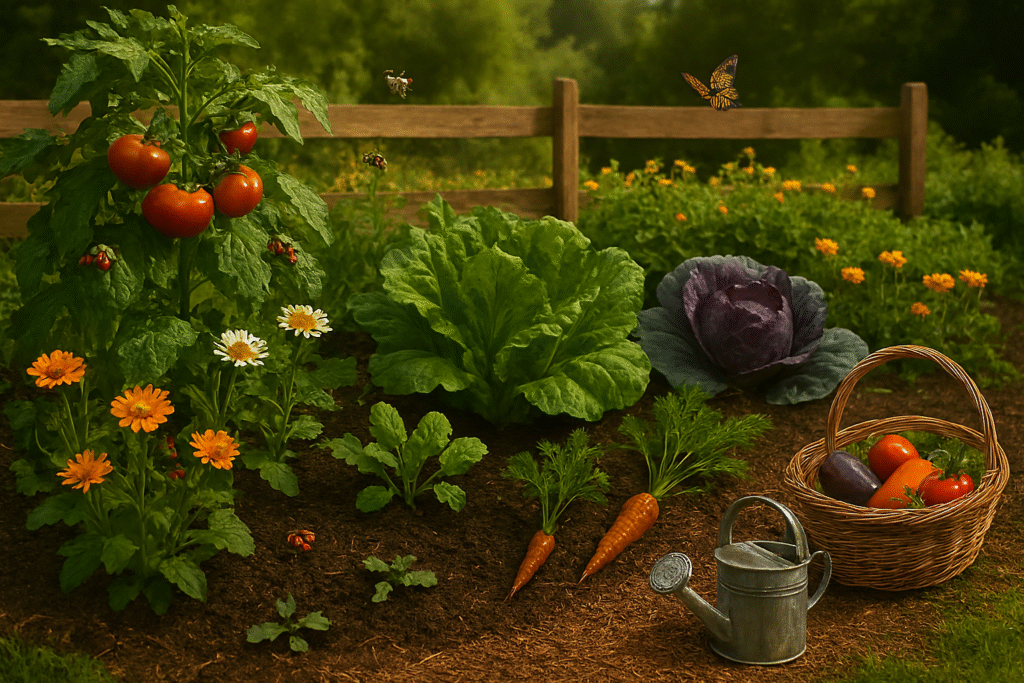
Introduction
Organic gardening isn’t just about skipping chemical sprays—it’s about creating a balanced, healthy ecosystem where plants, soil, and beneficial insects work together. By using natural methods of pest control, you can grow delicious fruits, vegetables, and herbs without harmful residues, while protecting pollinators and promoting biodiversity.
Whether you’re tending a small raised bed or a quarter-acre homestead garden, these techniques will help you manage pests while keeping your garden productive and chemical-free.
Benefits of Organic Gardening
- Healthier Food: No synthetic pesticides or fertilizers, meaning cleaner produce for you and your family.
- Pollinator Protection: Supports bees, butterflies, and other beneficial insects.
- Soil Longevity: Encourages long-term soil fertility and structure.
- Environmental Stewardship: Reduces chemical runoff into waterways and surrounding habitats.
- Cost Savings: Many organic pest control methods use simple, inexpensive materials.
Building Healthy Soil – Your First Pest Defense
Healthy plants resist pests better, so your first step in organic gardening is creating nutrient-rich, living soil.
Soil Health Tips
- Add compost annually to boost organic matter.
- Use cover crops like clover or rye to prevent erosion and fix nitrogen.
- Maintain soil pH by testing every 1–2 years.
- Rotate crops to reduce soil-borne diseases.
Product Recommendations:
- Soil Test Kits – Find them at local garden centers or online.
- Organic compost or worm castings – Ideal for building soil structure.
Identifying Common Garden Pests
You can’t control pests effectively if you don’t know who’s doing the damage. Regularly inspect plants for signs of:
- Chewed leaves (caterpillars, beetles)
- Yellowing leaves (aphids, spider mites)
- Stunted growth (root maggots, nematodes)
- Wilted plants despite moist soil (borers)
Use a garden journal or smartphone photos to track pest activity throughout the season.
Organic Pest Control Strategies
1. Companion Planting
Plant certain crops together to repel pests or attract beneficial insects.
- Basil & Tomatoes: Basil deters aphids and whiteflies.
- Marigolds & Squash: Marigolds repel nematodes and cucumber beetles.
- Dill & Carrots: Dill attracts parasitic wasps that prey on carrot rust flies.
2. Physical Barriers
Keep pests off plants without chemicals.
- Row covers to block flying insects.
- Copper tape to deter slugs and snails.
- Netting to protect berries from birds.
3. Beneficial Insects
Encourage predator species that naturally reduce pest populations.
- Ladybugs: Eat aphids, mealybugs, and mites.
- Lacewings: Consume aphids, caterpillars, and thrips.
- Parasitic Wasps: Control caterpillar and beetle larvae.
Tip: Plant nectar-rich flowers like alyssum, cosmos, and sunflowers to keep beneficial insects fed and active.
4. Homemade Organic Sprays
- Neem Oil Spray: Controls aphids, mites, and fungal issues.
- Garlic & Chili Spray: Repels chewing and sucking insects.
- Soap Spray: Smothers soft-bodied pests like aphids and spider mites.
Caution: Always test sprays on a small section of the plant first. Even organic solutions can harm beneficial insects if overused.
5. Cultural Practices
- Rotate crops each year to prevent pest build-up.
- Avoid over-fertilizing; excess nitrogen attracts pests.
- Water early in the day to discourage fungal growth.
Organic Pest Control Products
- Floating Row Covers – Gardeners Supply
- Neem Oil – Widely available at local hardware stores.
- Insecticidal Soap – Safe for most vegetables and flowers.
- Beneficial Insect Kits – Available online from suppliers like Arbico Organics.
Final Thoughts
Organic gardening is as much about prevention as it is about intervention. By building healthy soil, encouraging beneficial insects, and using targeted, non-toxic pest control methods, you can enjoy abundant harvests without resorting to harsh chemicals.
It’s a learning process—some seasons you’ll win the battle against pests easily, and other years you’ll be humbled by a horde of hungry tomato hornworms. But with every season, your knowledge grows along with your garden. And that, in itself, is worth the effort.
